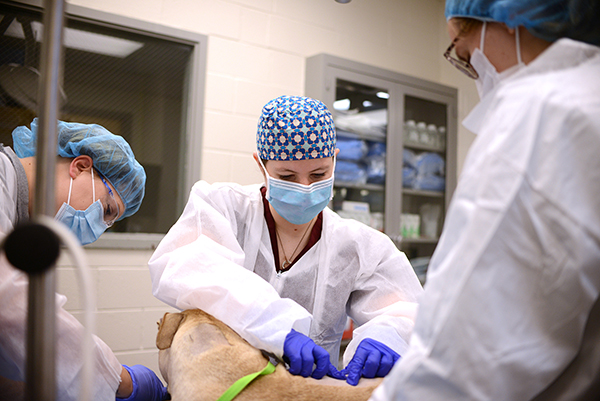Norm Badler: ACM SIGGRAPH Academy
Norm Badler, Rachleff Family Professor in the department of computer and information sciences in Penn Engineering and director of the Center for Digital Visualization, is among the eight new members elected to this year’s ACM SIGGRAPH Academy Class.
ACM SIGGRAPH, the Association for Computing Machinery’s Special Interest Group on Computer Graphics and Interactive Techniques, is “an international community of researchers, artists, developers, filmmakers, scientists and business professionals” who work in those disciplines. Election to the ACM SIGGRAPH is considered one of the highest awards in the field of computer graphics.
The ACM SIGGRAPH Academy is “an honorary group of individuals who have made substantial contributions to the field of computer graphics. These are principal leaders of the field, whose efforts have shaped the disciplines and/or industry, and led the research and/or innovation in computer graphics and interactive techniques.”
Dr. Badler was specifically elected for his “fundamental contributions to modeling virtual humans and computer animation, and for educating multiple generations of diverse computer graphics students.”
Dr. Badler’s highlighted research focuses on simulating human activities in crowds and urban settings including variables such as personality and external environment.
Juan Castrillón: Seldes Fellow
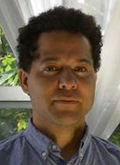 Juan Castrillón, who completed his PhD at the University of Pennsylvania in May, has been named the inaugural Gilbert Seldes Multimodal Postdoctoral Fellow at the Annenberg School for Communication.
Juan Castrillón, who completed his PhD at the University of Pennsylvania in May, has been named the inaugural Gilbert Seldes Multimodal Postdoctoral Fellow at the Annenberg School for Communication.
The newly established fellowship is named in memory of Gilbert Seldes, Annenberg’s founding dean. A decidedly multimodal scholar, Mr. Seldes published books of cultural criticism, wrote magazine columns, adapted plays for Broadway, made documentary films, wrote radio scripts, and was CBS’s first director of television. Multimodal scholarship has been a core concept at Annenberg since Mr. Seldes’ time, and the fellowship named in his honor seeks to support today’s multimodal scholars as they carve out space for themselves in academia and beyond.
“Theory and practice are inexorably linked, and we are committed to furthering the kinds of scholarship at Annenberg that engage with and benefit the public,” said Dean John L. Jackson, Jr. “We look forward to the ways Juan—and future Seldes fellows—will bring this commitment to life through their work.”
Dr. Castrillón’s research focuses on analytics of listening, world-building practices, and contemporary healing arts in Anatolia, Turkey; the Northwest Amazon in Colombia; and Philadelphia. He creates experimental ethnography as a response to contemporary debates in the academy. He uses filmmaking to develop a cinematic language that is respectful of Indigenous perspectives but also open to contemporary debates on gender and critical race theory.
As a Seldes Fellow, Dr. Castrillón will provide mentorship to the CAMRA undergraduate fellows program, collaborate with faculty and graduate students on multimodal projects, and continue his research about talismans in contemporary healing and media arts. His work theorizes that talismans thrive among those whose lives have been impacted by settler colonialism. While at Annenberg, he aims to produce peer-reviewed articles, short films, and to foster international collaboration between art-based research collectives.
Markus Blatz: Editor-in-Chief, Compendium of Continuing Education in Dentistry
 Taking on a new leadership role in the area of continuing dental education, Penn Dental Medicine’s Markus Blatz has been named editor-in-chief of the journal Compendium of Continuing Education in Dentistry. His appointment took effect with the May 2021 issue.
Taking on a new leadership role in the area of continuing dental education, Penn Dental Medicine’s Markus Blatz has been named editor-in-chief of the journal Compendium of Continuing Education in Dentistry. His appointment took effect with the May 2021 issue.
Published by AEGIS Communications, the Compendium has become an established leader in globally recognized continuing education, delivering peer-reviewed articles on new techniques, research, and critical issues in oral health. Dr. Blatz is just the third editor-in-chief in the publication’s 42-year history, succeeding Louis F. Rose, who held the post since 2008 and is now the journal’s editor emeritus. The late D. Walter Cohen founded the Compendium during his tenure as Penn Dental Medicine Dean (1972-1983), at the time making the Compendium the first university-affiliated publication to provide journal-based continuing education.
“The Compendium has always held a unique and steadfast place in the ever-evolving dental media world,” said Dr. Blatz, a professor of restorative dentistry and chair of the department of preventive and restorative sciences at Penn Dental Medicine. “It provides highly relevant educational content for the practicing dentist that combines state-of-the-art clinical excellence with scientific rigor. Leading the journal into the future is not just an incredible honor, but a responsibility that I will meet with great enthusiasm.”
Dr. Blatz, who is also Assistant Dean for Digital Innovation and Professional Development at Penn Dental Medicine, has been part of the school’s faculty since 2006. A leader in the field of esthetic dentistry, he founded the Penn Dental Medicine CAD/CAM Ceramic Center and has led the school’s digital innovation initiative.
Yun Ding, an assistant professor of biology in the School of Arts and Sciences, is one of 15 scientists selected as Searle Scholars for 2021. The Searle Scholars Program makes grants to selected universities and research centers to support the independent research of exceptional young faculty in the biomedical sciences and chemistry. This year, 191 applications were considered from nominations by 137 universities and research institutions.
“Our Scientific Advisory Board has identified 15 outstanding young scientists whose work brings new perspectives to important questions in genetics, immunology, neurobiology among other areas, and that will lead to new fields of study,” said Milan Mrksich, scientific director of the Searle Scholars Program.
Dr. Ding’s lab is working to understand the genetic and neural mechanisms by which animal behaviors evolve, using the courtship behaviors of Drosophila fruit flies and an approach that integrates genetics, molecular biology, and neurobiology.
FactCheck.org: 2020 Sigma Delta Chi Award
FactCheck.org has won a 2020 Sigma Delta Chi Award for fact-checking from the Society of Professional Journalists, its second consecutive annual honor from the organization. The winners of this year’s awards were announced by the SPJ on June 12, 2021.
FactCheck.org’s winning story was titled “Trump on the Stump.” In this October article, six FactCheck.org journalists enumerated and provided context for 46 of the false or misleading claims that President Donald Trump made over a five-day period before the 2020 election. They also published a companion piece about Democratic presidential candidate Joe Biden’s speeches over the same period.
The virtual awards ceremony praised FactCheck.org’s article on Trump’s stump speeches for including “all the necessary elements: originality, significance, depth, sourcing, logic, and clarity while also making the reader want to read on.”
A project of the Annenberg Public Policy Center, FactCheck.org has been honored by SPJ for excellence in professional journalism three times in all. Before winning the 2020 Sigma Delta Chi award, the site had been honored for an August 2019 story examining President Donald Trump’s claims about the U.S. domestic steel industry, as well as a 2010 non-deadline reporting award for independent news sites for health care reporting.
Founded in the early 1900s, SPJ’s mission states that the organization “promotes the free flow of information vital to a well-informed citizenry; works to inspire and educate the next generation of journalists; and protects First Amendment guarantees of freedom of speech and press.”
Alex Hughes: CAREER Award
 The National Science Foundation’s CAREER Award is given to early-career researchers in order to kickstart their careers in innovative and pivotal research while giving back to the community in the form of outreach and education. Alex Hughes, an assistant professor in bioengineering in Penn Engineering and in cell and developmental biology in the Perelman School of Medicine, is among the Penn Engineering faculty members who have received the CAREER Award this year.
The National Science Foundation’s CAREER Award is given to early-career researchers in order to kickstart their careers in innovative and pivotal research while giving back to the community in the form of outreach and education. Alex Hughes, an assistant professor in bioengineering in Penn Engineering and in cell and developmental biology in the Perelman School of Medicine, is among the Penn Engineering faculty members who have received the CAREER Award this year.
Dr. Hughes plans to use the funds to develop a human kidney model to better understand how the development of cells and tissues influences congenital diseases of the kidney and urinary tract.
The model, known as an “organoid,” is a lab-grown piece of human kidney tissue on the scale of millimeters to centimeters, grown from cultured human cells.
“We want to create a human organoid structure that has nephrons, the filters of the kidney, that are properly ‘plumbed’ or connected to the ureteric epithelium, the tubules that direct urine towards the bladder,” said Dr. Hughes. “To achieve that, we have to first understand how to guide the formation of the ureteric tubule networks, and then stimulate early nephrons to fuse with those networks. In the end, the structures will look like ‘kidney subunits’ that could potentially be injected and fused to existing kidneys.”
The field of bioengineering has touched on questions similar to those posed by Dr. Hughes, focusing on drug testing and disease treatment. Some of these questions can be answered with the “organ-on-a-chip” approach, while others need an even more realistic model of the organ. The fundamentals of kidney development and questions such as “how does the development of nephrons affect congenital kidney and urinary tract anomalies?” require an organoid in an environment as similar to the human body as possible.
“We decided to start with the kidney for a few reasons,” said Dr. Hughes. “First, because its development is a beautiful process; the tubule growth is similar to that of a tree, splitting into branches. It’s a complex yet understudied organ that hosts incredibly common developmental defects.
“Second,” he said, “the question of how things form and develop in the kidney has major medical implications, and we cannot answer that with the ‘organ-on-a-chip’ approach. We need to create a model that mimics the chemical and mechanical properties of the kidney to watch these tissues develop.”
The fundamental development of the kidney can also answer other questions related to efficiency and the evolution of this biological filtration system.
“We have the tendency to believe that systems in the human body are the most evolved and thus the most efficient, but that is not necessarily true,” said Dr. Hughes. “If we can better understand the development of a system, such as the kidney, then we may be able to make the system better.”
Dr. Hughes’ kidney research will lay the foundation for broader goals within regenerative medicine and organ transplantation.
“Although regenerative medicine is in its infancy, the kidney is a good candidate for research in this field,” said Dr. Hughes. “When we are born, we have a set number of nephrons, continually degrading over time. If we had the technology and understanding of how to regenerate or replace lost nephrons, we may be able to extend the life of these energetically costly organs, decreasing the need for kidney transplants.”
Donna Huryn: AWIS Lifetime Achievement Award
 Donna Huryn, an adjunct professor of chemistry in the School of Arts and Sciences, has received the Lifetime Achievement Award from the Philadelphia Chapter of the Association for Women in Science (AWIS). The award is a special honor conferred by the AWIS. Dr. Huryn is honored for excellence in research, teaching, and promoting the advancement of women in science.
Donna Huryn, an adjunct professor of chemistry in the School of Arts and Sciences, has received the Lifetime Achievement Award from the Philadelphia Chapter of the Association for Women in Science (AWIS). The award is a special honor conferred by the AWIS. Dr. Huryn is honored for excellence in research, teaching, and promoting the advancement of women in science.
Dr. Huryn is an organic chemist who studies the identification, characterization, and optimization of chemical probes of biological systems, including the identification of novel agents to treat neurodegenerative diseases such as Alzheimer’s, and the design of novel chemical libraries to probe biological systems. She previously received the 53rd American Chemical Society Philadelphia Section Award, which recognizes an individual who, through research, “has made important contributions to man’s knowledge and thereby aided the public appreciation of the profession.”
AWIS champions the interests of women in science, technology, engineering, and mathematics across all disciplines and employment sectors. Working for positive system transformation, AWIS strives to ensure that all women in these fields can achieve their full potential.
Soojin Jeong and William Weber: CTIC Summer Fellowships
The University of Pennsylvania Carey Law School’s Center for Technology, Innovation and Competition (CTIC) has awarded its Summer Public Interest Fellowships to Soojin Jeong, L’23, and William Weber, L’23.
The CTIC Summer Public Interest Fellowship provides funding for students who secure internships with public interest or government organizations that are doing work relevant to technology policy, intellectual property, cyber law, privacy, and related fields. These fellowships are open to first- and second-year students and offer them the opportunity to gain experience in technology law that might not otherwise be available to them.
Ms. Jeong will be working on emerging privacy and civil liberties issues at the Electronic Privacy Information Center (EPIC) in Washington D.C. this summer.
Mr. Weber will work with the Department of Justice’s Antitrust Division in the Defense, Industrials, and Aerospace section, which is responsible for civil antitrust enforcement, competition advocacy, and competition policy.
CTIC is dedicated to promoting foundational research that aims to shape the way legislators, regulatory authorities, and scholars think about technology policy, intellectual property, privacy, and related fields. Through major scholarly conferences, symposia, faculty workshops, educational programs, and other activities, CTIC is committed to providing a forum for exploring the full range of scholarly perspectives on these issues.
Carol Muller and West Philadelphia High School: Provost-Netter Center Faculty-Community Partnership Award
 Penn Provost Wendell Pritchett and Netter Center Director Ira Harkavy have named Carol Muller, a professor of music in the School of Arts and Sciences, and her partners at West Philadelphia High School as the recipients of the 2021 Provost/Netter Center Faculty-Community Partnership Award.
Penn Provost Wendell Pritchett and Netter Center Director Ira Harkavy have named Carol Muller, a professor of music in the School of Arts and Sciences, and her partners at West Philadelphia High School as the recipients of the 2021 Provost/Netter Center Faculty-Community Partnership Award.
Carol Muller is a professor of music and director of the minor in jazz and popular music studies. She is being recognized for her exceptional work on projects that engage Penn graduate and undergraduate students in music, arts, and wellness partnerships with the West Philadelphia/Philadelphia community through Academically Based Community Service (ABCS).
Dr. Muller is being honored for the quality and sustainability of the partnerships she has created over the years with schools and with jazz, gospel, Islamic and recent African diaspora communities in West Philadelphia. Since 2001, Dr. Muller has taught numerous ABCS courses in ethnomusicology, working closely with many West Philadelphia partners, including Millennium Baptist Church, the Quba Institute, Second Antioch Baptist Church, the Sudanese American community in Cobbs Creek, and West Philadelphia High School. Among other things, the collaborative research projects involving Dr. Muller, Penn graduate and undergraduate students, and community partners have produced multiple forms of media that tell the stories of the history and evolution of jazz and gospel music in West Philadelphia. Dr. Muller’s ABCS work has made a positive and enduring impact on Penn students, community partners, and colleagues who have had the opportunity to work with her.
Herman Beavers, a member of the review committee, stated, “Dr. Muller pioneered the arts-based community service-learning course at Penn. Her ability to establish mutuality and trust is nothing short of miraculous. She approaches every community partner with reverence and respect, and perhaps most importantly, a genuine curiosity about and openness to whatever they are willing to share.”
West Philadelphia High School will be the co-recipient of the financial component of the award. The $10,000 award will be evenly divided between Dr. Muller and her community partners in order to further develop and expand their work together to create a therapeutically informed sustainable music technology program that can serve as a local and national model. This is a collaborative project between Penn faculty, Netter Center University-assisted community school staff, Penn undergraduates, and the teachers, administrators, Support Team for Education Project (STEP) personnel, and students at West Philadelphia High School. The project seeks to address student trauma by combining the School District of Philadelphia’s STEP behavioral health intervention with a fully equipped music technology studio as a gathering space for students to learn how to use the technology, to listen to the creative work of others, to collaborate, and make their own beats/words. The goal is for students to recognize the impact of trauma caused by poverty and violence, and to be given psychological and artistic resources to turn their lives around, to begin to hope, and to imagine a way into a more productive place in their lives.
Three Penn Scientists: 2021 Pew Scholars
The Pew Charitable Trusts have named Kellie A. Jurado, Presidential Assistant Professor of Microbiology, and Colin Conine, an assistant professor of pediatrics and genetics, both in the Perelman School of Medicine, as two of 22 early-career researchers nationwide selected as 2021 Pew Scholars in the Biomedical Sciences. The Pew Charitable Trusts and the Alexander and Margaret Stewart Trust have also selected Liling Wan, an assistant professor of cancer biology, to join four other researchers in the U.S. as the 2021 class of Pew-Stewart Scholars for Cancer Research.
The 2021 Pew Scholars in the Biomedical Sciences were chosen from 198 applicants nominated by leading academic institutions and researchers across the United States. These scientists will receive funding over the next four years as they investigate timely questions surrounding human health and disease. Dr. Conine will investigate how regulatory RNAs carried by sperm influence embryonic development and offspring phenotype. Dr. Jurado will examine how cells in the placenta protect an embryo from being rejected by the maternal immune system.
The five early-career scholars who comprise the 2021 class of Pew-Stewart Scholars for Cancer Research will each receive a four-year grant to advance cutting-edge research into the development, diagnosis, and treatment of cancer. This is the eighth year that the Alexander and Margaret Stewart Trust has partnered with Pew to support researchers as they investigate breakthroughs to advance treatments and cures for the complex disease. Dr. Wan will investigate how assemblies of proteins come together to regulate the expression of genes and how dysregulation of this process contributes to cancer.
Recent PSOM Awards and Accolades
Christopher Chesley, a fellow in pulmonary and critical care, was awarded the 2021 ATS Fellowship in Health Equality and Diversity. This fellowship is designed to support the efforts of senior fellows, postdoctoral students, or junior faculty with research, clinical, and policy endeavors to advance health equality for patients with respiratory disease, critical care illness or injury, and sleep disordered breathing. Dr. Chesley’s research focuses on disparities in critical care delivery for patients with sepsis and acute respiratory failure. He also researches the impact of critical illness on hospital readmissions, and the disparities that result in care coordination. The ATS Fellowship in Health Equality and Diversity will provide up to $25,000 to support the efforts of the successful candidate from July 1, 2021, through June 30, 2022.
Penn Medicine was recognized by the Pheo Para Alliance, a patient advocacy organization dedicated to supporting those with pheochromocytoma and paraganglioma, rare neuroendocrine tumors, as a Center of Excellence. The Center of Excellence Program recognizes institutions worldwide for providing cutting-edge, quality, multi-disciplinary care and participating in pheochromocytoma and paraganglioma related research. The Penn Medicine Neuroendocrine Tumor Center, led by Debbie Cohen and Daniel Pryma, has developed an interdisciplinary approach to the diagnosis, staging, and treatment of patients with these rare disorders.
Katalin Karikó, an adjunct associate professor of neurosurgery whose foundational research with Drew Weissman set the stage for the BioNTech/Pfizer and Moderna mRNA vaccines, was awarded the 2022 Vilcek Prize for Excellence in Biotechnology. The prize is awarded by the Vilcek Foundation to those who advocate for immigrant causes or who are immigrants to the US and who have had a big effect on both the United States and the world. “Dr. Karikó’s work has obviously had a tremendous impact on science and medicine—but the development of mRNA vaccines based on her research also has a profound humanitarian significance,” said Marica Vilcek, cofounder of the Vilcek Foundation.” The honor comes with a cash award of $100,000.
Renyu Liu, a professor of anesthesiology and critical care, directed an educational short film that recently won two awards at this year’s NYC International Film Festival. The film, titled Wake Up Stroke 120, won the NYC IFF’s Humanitarian Award and the Best Short Narrative Film Award. Dr. Liu has dedicated much of his career to spreading stroke awareness (including as it relates to the COVID-19 pandemic), not just to patients and students but also to the community as a whole, especially in his native China.
David Mankoff, vice chair for research in radiology, and Sean Carlin, a research associate professor of radiology, were awarded a five-year, $3.5 million academic-industry partnership grant from the National Cancer Institute between Penn Medicine, Washington University, MD Anderson Cancer Center, and the Philadelphia-based biotechnology company Trevarx Biomedical. The aim of the grant is to implement and execute a multi-center pilot study of the diagnostic accuracy of a novel PET radiotracer, with the long-term goal of a Phase III clinical trial to bring the agent to the clinic. PARP inhibitors have emerged as an important new therapy that target a broadening class of gene mutations present in ovarian, breast, and a host of other cancers. Identifying patients who might benefit from this treatment is imperfect, and therefore, there is a strong need for the development of a predictive imaging marker.
Nuala J. Meyer, an associate professor of medicine and director of the Center for Translational Lung Biology, was inducted into the American Society of Clinical Investigation. She and other new members come from 43 institutions and represent excellence across the breadth of academic medicine. Dr. Meyer is one of 80 inductees out of 245 nominees. Dr. Meyer’s research focuses on genomic and molecular risk factors for acute respiratory distress syndrome and other forms of sepsis-associated organ failure, in order to identify potential biologic subtypes that may warrant precision treatments. More recently, she has investigated COVID-19-related sepsis to identify distinct patterns of immune response. She is committed to the training of future physician scientists and enhancing translational research training and was awarded an NHLBI K24 to support this mentorship. She is a passionate advocate of team science and harmonization between clinical trials and mechanistic investigation, as well as between fundamental and patient-oriented investigations, to accelerate the impact of science for patients.
Jason Moore, director of the Institute for Biomedical Informatics and a professor of biostatistics, epidemiology and informatics, was elected to be a fellow in the International Academy of Health Sciences Informatics’ Class of 2021. Formed in 2017 as part of the International Medical Informatics Association, the International Academy of Health Sciences Informatics seeks to guide and generate leadership on the study of computational systems and data in health care. Fellows are nominated and elected because of their globally recognized work. “It is an honor to be recognized by my peers from around the world who are advancing the discipline of informatics for the purpose of studying human health and advancing healthcare,” Dr. Moore said.
Joan O’Brien, chair of ophthalmology, and researchers at the Scheie Eye Institute were awarded a five-year, $6.6 million National Eye Institute grant renewal to investigate genetic variants associated with primary open-angle glaucoma (POAG) in Black people. This grant builds upon an original $11.2 million study, funded in 2014, which recruited and genotyped 10,255 patients from Philadelphia. POAG disproportionately affects Black people. Current treatment options aim to lower the pressure in the eye, but are insufficient to prevent vision loss in roughly one-third of patients. The researchers’ long-term goal is to understand the biological importance of the disease variants in order to develop more personalized diagnostic and treatment strategies for this understudied population.
Nicole Rust: 2021 Troland Research Award
Nicole Rust, an associate professor of psychology in the School of Arts and Sciences, received a 2021 Troland Research Award from the National Academy of Sciences. The annual award recognizes unusual achievement by early-career researchers and fosters empirical research in experimental psychology. Dr. Rust, who studies the neural basis of visual memory, was selected for her “contributions to the understanding of how the cortex makes use of complex visual information to guide intelligent behavior.” She received a PhD in neural science from New York University and joined the Penn faculty in 2009.
Arts & Sciences Office of Advancement Communications Team: Four CASE Awards
The Penn Arts & Sciences Office of Advancement Communications team has been recognized with four Circle of Excellence Awards from the Council for Advancement and Support of Education (CASE). The team received:
- A gold award for cover design for the spring/summer 2020 issue of OMNIA: The judges commented on the wonderful illustration as well as the designer’s “deft touch” in handling a lot of type and creative use of metallic ink, which they said “adds a luminosity that comes through even in the PDF.”
- A silver award for feature writing for “Between Critique and Action,” the story that was featured in the spring/summer cover illustration. The feature described how student researchers with the Penn Program in Environmental Humanities partnered with community leaders to imagine a “future beyond refining” after the explosion of the Philadelphia Energy Solutions refining complex. The judges called it “an excellent piece of journalism” and “a model for others.”
- A bronze award for feature writing for “The New Cartographers,” also from the spring/summer 2020 OMNIA. This feature showed the ways Penn faculty are using maps to understand and communicate information, and evaluate it across space and time. The judges loved the creative approach to big data and said, “If there was an award for pure surprise this would win it, simply for presenting a subject that took us by surprise and delight.”
- A bronze award in the podcast category for the first season of In These Times, which used COVID as a platform to explore the science, social science, and history that shaped events in 2020. Drawing on the talents of everyone in the editorial, digital media, and design teams, In These Times was commended for helping “listeners understand complicated information that might otherwise be over their heads.”
CASE is a global non-profit association dedicated to educational advancement: alumni relations, communications, development, marketing, and advancement services who share the goal of championing education to transform lives and society. The Circle of Excellence awards “acknowledge superior accomplishments that have lasting impact, demonstrate the highest level of professionalism, and deliver exceptional results.” This year, there were 2,900 entries from 27 countries in 100 categories.
Matthew Stitt: Fels Distinguished Fellow
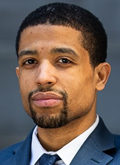 The Fels Institute of Government announced the appointment of Matthew Stitt, MPA ’12, as a distinguished fellow. The appointment is a recognition of Mr. Stitt’s work and multiple contributions to Fels and the broader University of Pennsylvania community.
The Fels Institute of Government announced the appointment of Matthew Stitt, MPA ’12, as a distinguished fellow. The appointment is a recognition of Mr. Stitt’s work and multiple contributions to Fels and the broader University of Pennsylvania community.
As a distinguished fellow, Mr. Stitt will help equip Fels students to engage in today’s critical policy issues and to create a more diverse and equitable public sector. His efforts will include leading a speaker series on racial equity and social justice, supporting internships and student mentorship, and connecting students and alumni. While this is an expanded role for Mr. Stitt, he has long been an important part of the Fels community, having previously served as an adjunct lecturer, student mentor, and Capstone advisor.
“Matt’s track record in advancing public policy with a lens on equity, along with his steadfast support for training new leaders, makes him a true asset to the Fels community,” said faculty directors Matt Levendusky, Penny and Robert A. Fox Director of the Fels Institute of Government, and John Lapinski, Robert A. Fox Leadership Professor of Political Science. “We are excited for him to formalize this role as a distinguished fellow and look forward to him working with Fels students for many years to come.”
The newly created distinguished fellow position is supported by the Fels Institute of Government and is part of Fels’ continued commitment to advancing racial equity and social justice. In addition to continuing the speaker series, Mr. Stitt and Fels will support other specific programming focused in these areas.
Landscape Architecture Faculty: World Landscape Architecture Award
The 2021 World Landscape Architecture Awards were recently announced and a project by PEG office of landscape + architecture, the firm of Karen M’Closkey and Keith VanDerSys, associate professor and senior lecturer, respectively, in the department of landscape architecture in the Weitzman School of Design, received an honorable mention.
Their project, Fantasy Island: The Galápagos Archipelago, which was one of over 400 entries, is one of five projects selected in the Concept - Analysis and Planning category of the awards. Award winners included designs focused on sites across the world and included submissions from such firms as Sasaki and Change Studio.
Fantasy Island builds on work begun in a landscape architecture studio course offered in 2017-2018 that sought to address challenges related to population growth in the town of Puerto Baquerizo Moreno, on San Cristóbal Island. That course was part of a Penn partnership called the Galápagos Education and Research Alliance and a four-part publication documents the design proposals from the studio.
Fantasy Island grew out of conversations between Ms. M’Closkey and Michael Weisberg, whose initiatives with the Galápagos Alliance include community science, climate-resilient design, and public health. The alliance has involved faculty from five schools at Penn, including Weitzman. Its primary focus has been on helping the people who live on the islands build a better understanding of the protected lands, which they are rarely able to access.
Five Philadelphia Teachers Awarded National Fellowships
Teachers Institute of Philadelphia (TIP) Fellows and local educators Alex de Arana, Matthew Menschner, Christopher Sikich, Charlette Walker and Lisa Yau have been chosen to participate in national seminars hosted by TIP’s parent organization the Yale National Initiative to strengthen teaching in public schools. The summer intensive program provides public school teachers deeper knowledge of the subjects they teach and an opportunity to learn from internationally renowned Yale faculty members and colleagues around the nation.
The 2021 fellows, who all teach in the School District of Philadelphia, are:
- Alex de Arana is enrolled in U.S. Social Movements through Biography, led by David Engerman, and plans to write a curriculum unit entitled Who Built the American Economy. Mr. de Arana currently teaches 11th and 12th grade social studies at William W. Bodine High School.
- Matthew Menschner is enrolled in Gender, Race, and Class in Today’s America, led by Frances Rosenbluth of Yale, and plans to write a curriculum unit entitled Who Writes Our History? Gender, Race, and Inequality in the United States. Mr. Menscher is a 10th grade history teacher at Kensington CAPA High School.
- Christopher Sikich is enrolled in The Sun, the Solar System and Us, led by Sarbani Basu of Yale, and plans to write a curriculum unit entitled Lead, Evolution. He teaches 9th-12th grade biology at Philadelphia High School for Girls.
- Charlette Walker is enrolled in Human Centered Design of Biotechnology, led by Anjelica Gonzalez of Yale, and plans to write a curriculum unit entitled Biotechnological Advances: Blessing or Behomoth? Ms. Walker teaches 5th-8th grade digital literacy at Tilden Middle School.
- Lisa Yau is enrolled in Yale professor Ian Shapiro’s seminar Democracy and Inequality: Challenges and Possible Solutions and plans to write a curriculum unit entitled Still Separate, Still Unequal. Ms. Yau teaches 4th grade students at Francis Scott Key School.
The Teachers Institute of Philadelphia (TIP) enables Philadelphia public school teachers to enroll in semester-long seminars taught by University of Pennsylvania and Temple University professors. During the seminars, teachers engage intensively with a topic that is on the cutting-edge of knowledge in the sciences, arts, humanities or social sciences, and write an original curriculum unit based on what they have learned. Teachers then implement their units in the classroom and share them with their colleagues through an online curriculum repository. The program is free of charge, and those who complete it receive a stipend and Act 48 professional development credits. Participating teachers (called fellows) are encouraged to become leaders, sharing their curriculum ideas with peers and shaping the TIP program.

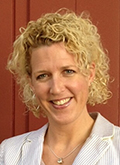 Senior Vice Provost for Research Dawn Bonnell announced the appointment of F. Claire Hankenson as Associate Vice Provost for Research and executive director of University Laboratory Animal Resources (ULAR), effective November 1, 2021. Dr. Hankenson will also serve as Penn’s attending veterinarian. In these roles, she will oversee ULAR and lead the division of laboratory animal medicine as a professor of clinical pathobiology in the School of Veterinary Medicine.
Senior Vice Provost for Research Dawn Bonnell announced the appointment of F. Claire Hankenson as Associate Vice Provost for Research and executive director of University Laboratory Animal Resources (ULAR), effective November 1, 2021. Dr. Hankenson will also serve as Penn’s attending veterinarian. In these roles, she will oversee ULAR and lead the division of laboratory animal medicine as a professor of clinical pathobiology in the School of Veterinary Medicine. Dolores Albarracín has been named the University of Pennsylvania’s twenty-eighth Penn Integrates Knowledge University Professor, effective July 1, 2021.
Dolores Albarracín has been named the University of Pennsylvania’s twenty-eighth Penn Integrates Knowledge University Professor, effective July 1, 2021.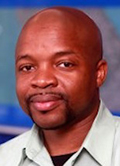 University of Pennsylvania President Amy Gutmann has appointed De’Broski R. Herbert, a faculty member in the department of pathobiology at the School of Veterinary Medicine (Penn Vet), as Presidential Associate Professor.
University of Pennsylvania President Amy Gutmann has appointed De’Broski R. Herbert, a faculty member in the department of pathobiology at the School of Veterinary Medicine (Penn Vet), as Presidential Associate Professor. In the United States, LGBTQ+ youth—including lesbian, gay, bisexual, transgender, and queer adolescents—are 10-30% more likely to vape than their non-LGBTQ+ peers. Because vaping increases the risk of beginning to smoke cigarettes or use other tobacco products by four-fold, LGBTQ+ youth are at a greater risk for tobacco use and tobacco-related health concerns.
In the United States, LGBTQ+ youth—including lesbian, gay, bisexual, transgender, and queer adolescents—are 10-30% more likely to vape than their non-LGBTQ+ peers. Because vaping increases the risk of beginning to smoke cigarettes or use other tobacco products by four-fold, LGBTQ+ youth are at a greater risk for tobacco use and tobacco-related health concerns.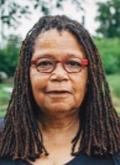 The Institute of Contemporary Art at the University of Pennsylvania has announced visionary artist, writer, filmmaker, and activist Linda Goode Bryant’s appointment as the 2021-2022 Katherine Sachs, CW’69, and Keith L. Sachs, W’67, Guest Curator. Ms. Goode Bryant’s role will be as artistic director of the forthcoming initiative RAW Académie, Session 9: Infrastructure, an innovative collaboration between ICA and the Dakar-based RAW Material Company, to be held in Philadelphia in spring 2022.
The Institute of Contemporary Art at the University of Pennsylvania has announced visionary artist, writer, filmmaker, and activist Linda Goode Bryant’s appointment as the 2021-2022 Katherine Sachs, CW’69, and Keith L. Sachs, W’67, Guest Curator. Ms. Goode Bryant’s role will be as artistic director of the forthcoming initiative RAW Académie, Session 9: Infrastructure, an innovative collaboration between ICA and the Dakar-based RAW Material Company, to be held in Philadelphia in spring 2022.
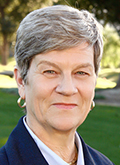 The Center for Ethics and the Rule of Law (CERL) at the University of Pennsylvania will become formally affiliated with the University’s Annenberg Public Policy Center (APPC), moving from Penn Law, the centers announced on June 24. The decision, effective July 1, 2021, was fueled by the centers’ desire to join forces and have a greater impact in promoting and strengthening the rule of law in democratic governance.
The Center for Ethics and the Rule of Law (CERL) at the University of Pennsylvania will become formally affiliated with the University’s Annenberg Public Policy Center (APPC), moving from Penn Law, the centers announced on June 24. The decision, effective July 1, 2021, was fueled by the centers’ desire to join forces and have a greater impact in promoting and strengthening the rule of law in democratic governance.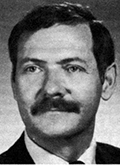 Malcolm A. Lynch, a former professor of oral medicine and an interim dean of Penn’s School of Dental Medicine, died on June 4 of natural causes. He was 88.
Malcolm A. Lynch, a former professor of oral medicine and an interim dean of Penn’s School of Dental Medicine, died on June 4 of natural causes. He was 88. Juan Castrillón, who completed his PhD at the University of Pennsylvania in May, has been named the inaugural Gilbert Seldes Multimodal Postdoctoral Fellow at the Annenberg School for Communication.
Juan Castrillón, who completed his PhD at the University of Pennsylvania in May, has been named the inaugural Gilbert Seldes Multimodal Postdoctoral Fellow at the Annenberg School for Communication. Taking on a new leadership role in the area of continuing dental education, Penn Dental Medicine’s Markus Blatz has been named editor-in-chief of the journal Compendium of Continuing Education in Dentistry. His appointment took effect with the May 2021 issue.
Taking on a new leadership role in the area of continuing dental education, Penn Dental Medicine’s Markus Blatz has been named editor-in-chief of the journal Compendium of Continuing Education in Dentistry. His appointment took effect with the May 2021 issue. The National Science Foundation’s CAREER Award is given to early-career researchers in order to kickstart their careers in innovative and pivotal research while giving back to the community in the form of outreach and education. Alex Hughes, an assistant professor in bioengineering in Penn Engineering and in cell and developmental biology in the Perelman School of Medicine, is among the Penn Engineering faculty members who have received the CAREER Award this year.
The National Science Foundation’s CAREER Award is given to early-career researchers in order to kickstart their careers in innovative and pivotal research while giving back to the community in the form of outreach and education. Alex Hughes, an assistant professor in bioengineering in Penn Engineering and in cell and developmental biology in the Perelman School of Medicine, is among the Penn Engineering faculty members who have received the CAREER Award this year. Donna Huryn, an adjunct professor of chemistry in the School of Arts and Sciences, has received the Lifetime Achievement Award from the Philadelphia Chapter of the Association for Women in Science (AWIS). The award is a special honor conferred by the AWIS. Dr. Huryn is honored for excellence in research, teaching, and promoting the advancement of women in science.
Donna Huryn, an adjunct professor of chemistry in the School of Arts and Sciences, has received the Lifetime Achievement Award from the Philadelphia Chapter of the Association for Women in Science (AWIS). The award is a special honor conferred by the AWIS. Dr. Huryn is honored for excellence in research, teaching, and promoting the advancement of women in science. Penn Provost Wendell Pritchett and Netter Center Director Ira Harkavy have named Carol Muller, a professor of music in the School of Arts and Sciences, and her partners at West Philadelphia High School as the recipients of the 2021 Provost/Netter Center Faculty-Community Partnership Award.
Penn Provost Wendell Pritchett and Netter Center Director Ira Harkavy have named Carol Muller, a professor of music in the School of Arts and Sciences, and her partners at West Philadelphia High School as the recipients of the 2021 Provost/Netter Center Faculty-Community Partnership Award. The Fels Institute of Government announced the appointment of Matthew Stitt, MPA ’12, as a distinguished fellow. The appointment is a recognition of Mr. Stitt’s work and multiple contributions to Fels and the broader University of Pennsylvania community.
The Fels Institute of Government announced the appointment of Matthew Stitt, MPA ’12, as a distinguished fellow. The appointment is a recognition of Mr. Stitt’s work and multiple contributions to Fels and the broader University of Pennsylvania community.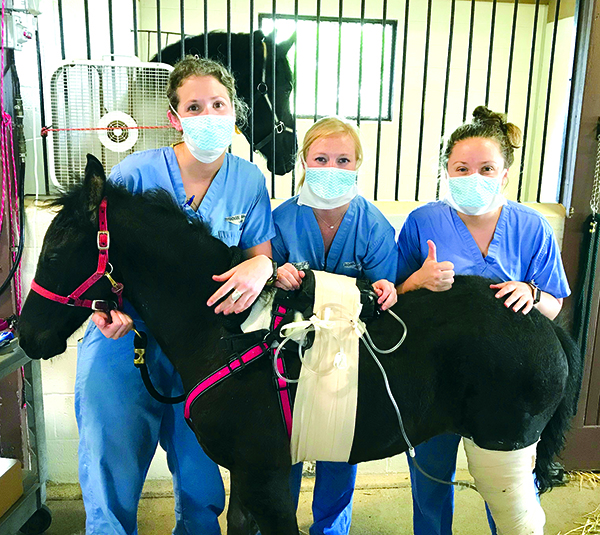
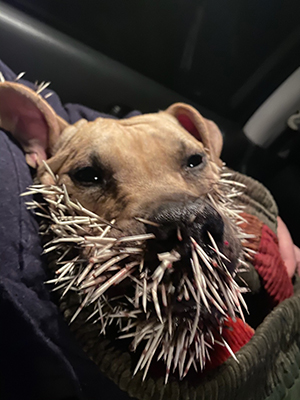 Ryan Hospital surgical resident Chiara Curcillo has conducted fewer surgeries than Dr. Ortved. But she has been around the specialty for many years, in a sense having grown up at Penn Vet. Dr. Curcillo’s physician parents pioneered a single incision, minimally invasive laparoscopic surgical technique for humans. Jeffrey Runge brought it to animals when he was an assistant professor of surgery at Ryan Hospital.
Ryan Hospital surgical resident Chiara Curcillo has conducted fewer surgeries than Dr. Ortved. But she has been around the specialty for many years, in a sense having grown up at Penn Vet. Dr. Curcillo’s physician parents pioneered a single incision, minimally invasive laparoscopic surgical technique for humans. Jeffrey Runge brought it to animals when he was an assistant professor of surgery at Ryan Hospital.